- Home
- Clarice Lispector
The Apple in the Dark Page 6
The Apple in the Dark Read online
Page 6
of lying was that he was not sure where his lie was heading. And
then, as he faced that ambiguity, his head began to fog up even
more as a defensive measure. And with a little trick he had
brought along from before the great leap, he became ingenuous.
Once recovered, he again took up his sermon to the stones :
"With an act of violence that person of whom I spoke killed
an abstract world and gave it blood."
And he said that with the stoical resignation of a person who
has already tried to take away the stress from lie or truth. That
man had just made the definitive act of dissociating himself,
after which he was more than satisfied to look. Things were
getting better and better. From underneath he was beginning to
recognize the table more and more.
And now, sitting on a rock with a bird in his hand, his mouth
dry with thirst, his eyes burning-after his crime-that man
would never again have any need for revolt. From that time
forward he would have the chance to live without doing evil
because it had already been done; now he was an innocent.
Who can tell whether he had thought to go so far with his
unpremeditated crime. But this thought also came to him, "He
had become an innocent." And, in God's name, he had never
thought of coming so far, but he had freed himself from a kind
of suffocating piety, now that he was no longer guilty. "If you
really do understand me," he thought with deep fatuity, for he
had freed himself of the great guilt by making it concrete. And
now that he was at last a bandit, he was free. He was, in short, a
fugitive. And that afforded him all the possibilities open to
desperate people. "I have killed many birds with one stone," he
said.
The stones, large and small, were waiting. Martim was very
confident because his audience was no more intelligent than he,
and he felt at ease. Besides, that man had never had an audience, strange as it seems. The fact is he had never remembered having organized his soul into speech, he did not believe in
talking-perhaps through fear that if he talked, he himself
( 3 3 )
T H E A P P L E
I N T H E D A R K
would end up not recognizing the table he was eating from. If he
was talking now it was because he did not know where he was
heading or what was going to become of him, and all that put
him right into the heart of freedom. Leaving out the fact that
thirst was stirring in him like an ideal.
Furthermore, his improvised audience was not a cultured
one, and so he was taking advantage of it just as one habitually
and wisely takes advantage of an inferior and is taken advantage
of by his superiors. His own lack of culture had always been an
embarrassment to him; it had been his habit to make endless
lists of books he meant to read, and he would try to keep them
up to date but new ones were always coming out and that
embarrassed him-a man who never even looked at the newspapers. He had even tried to plumb the depths of "collective psychology," since he had always dealt with numbers and had
always been a man who could easily imitate intelligence; but he
had never had the time-his wife would drag him off to the
movies, and he would be relieved to go.
The stones were waiting. Some were round and dead like
stones from the moon; they were like cross-eyed, patient, children. But the others were sun-stones and looked him straight in the eye. "Like jewels," he thought, as he had always had a
general tendency to compare things to jewels. The stones were
waiting for the continuation of what he had begun to think.
From time to time they would have a look of fervent life which
passed a painful surge of empty happiness on to the man. "I
think," he thought suddenly, "that until the day I die I will be
very happy."
The sun was paining his head deeply, and the man made
another effort to speak because he had felt a crisp facility within
himself-just as when one has something to say, and even if he
does not know how, finds that minimum of inspiration gives one
strength for painful groping. Even he wanted to speak, because
there is no law preventing a man from speaking. And all the
while what fascinated Martim was the absence of any impediments, besides which, he knew quite well that the world was so
How a Man Is Made
big that very soon even he would have to limit himself. The
stones were waiting, having come from everywhere for the
conspiracy, to which, he as a traveler, was bringing the latest
news. Some stones were small and infantile, others large and
pointed-all sitting in the assembly of innocence. It was an
uneven audience where childhood and maturity were mixed in
together.
"Childhood and maturity," he then said to them suddenly.
"And yet there had been a period when the world was smooth
like the skin of a fruit. We, its neighbors, did not bite into it
because it was easy to bite, and there was plenty of time. Life
was as yet not short in that time. And because of that the trees
grew. The trees grew as if there was nothing in the world except
for trees to grow, until the sun was blotted out, and people came
in closer, and springs flowed, and mosquitoes emerged out of the
hearts of flowers : this was growth. It was mature. It was richer
and more frightening; in some way it became much more
'worthwhile.' Nights became longer, father and mother had
been denied; there was a terrible thirst for love. It was the
kingdom of fear. And it was no longer enough to have been
born-heroism was being born. But eloquence had a bad sound
to it. People ran into each other in the dark; every light confused
and blinded them, and truth was good for only one day. Then all
of our troubles arrived at a solution. We were lost among the
solutions that had preceded us at every step. In just a few
seconds an idea would become original; when we saw a photograph with light and shadows and paving stones that were wet with rain, we would exclaim, tired and unanimously, This is very
original. Everything was deep and fetid, ready for birth, but the
child would not be born. I'm not saying it wasn't good-it was
fine! But it was just as if a person could only watch, and
Saturday night would be that hell of generalized intentions if
there were no poker game. In the meantime nothing ever
stopped; it even kept on going at night. Power had become
great; hands intelligent. Everybody was powerful, everybody was
a tyrant, and I never let anyone step on my foot, my astuteness
( 3 5 )
T H E A P P L E
I N T H E D A R K
became magnificent with the help of a little practice. There
were, however, those who in spite of their maturity had-had
childhood gnawing at their breasts like leprosy."
The man spoke this last phrase with vanity because it
seemed to him that he had put his words together with some
degree of perfection. Of course, what made Martim feel such
perfection was the fact that his words had in some way gone
beyond what he had wanted to say. And
even though he felt
deceived by them he preferred what he had said to what he had
really wanted to say because of the much more certain way in
which things go beyond us. This also gave him, at the same
time, a feeling of defeat and of resignation from the way in
which he had just sold himself to a phrase that had more beauty
than truth to it. The first thing he was squandering his new
wealth on was an audience; but this had already forced him into
an established truth, and he was disappointed, even a little
curious. He had really spoken only once before; he had taken a
few drinks, and had delivered an oration in a house of prostitution where the women had also looked like sitting jewels-it was getting on to dawn; work was done, and they were childlike and
mature.
"Yes. It was as if there were those who had childhood in
their breasts-as if our future were only in our memory," he
informed the stones. "But it is also true that the moments of
sweetness were very intense. And it is also true that music heard
in the past can make the whole machinery come to a halt and
dumbfound the world for a moment. 'A moment of silence,' my
wife's radio used to say, 'for the death of the general.' There
would be a terrible uneasiness for that moment; no one would
look up even though the general was a stranger to us. It was
unhappiness in all of its virile strength. Besides there was no
other way to be adult, and people enjoyed and approved; nobody
was that simple-minded. It is true that once in a while somebody
would speak in a very low voice. Then everybody would come
scurrying from opposite corners to listen to the low voice. But
the truth is that everybody was suffering from not being able to
comment and from not being called upon to either."
( 3 6 )
How a Man Is Made
"But," said the man, a little offended by the passive natural·
ness with which the stones seemed to accept everything he was
telling them-he had had experience with foreigners who were
not mixed up in this and simply took pictures-"But the world
too is more than that! " he said to them patriotically. "There
were a lot of other good things besides! and it was for that reason
that, much more than for toleration, that we wanted one another
so much. Oh, how we wanted one another! even if the paint was
peeling off the walls," the man said, a little distracted, losing his
footing. "There were houses that were still unsold, and many
people who did not study languages," he said with envy for those
who had studied languages. "And just the same for one time as
another-perhaps because if the wrong door had been openedyou understand ! Which makes for the fact that sometimes again there was nothing except trees growing, tall and peaceful. And
especially, especially there were children rising up from our fields
of battle, pure and fateful fruit of disastrous love."
In spite of being satisfied, Martim, having said what he had
to say, felt tired, as if there had been a mistake in something he
had said-as if he had been obliged to add up the infinite figures
all over again. At some unidentifiable point, that man had
become prisoner of a ring of words. "Did I forget to mention
something?" The stones were certainly going to get a bad
impression. For someone who had never seen a head of hair, a
strand of hair, it was nothing, and a fish pulled out of his water is
nothing but a shape.
For honesty's sake, he wanted to make clear to them that he
knew it was the sun that was inflating his words and making
them so overdone and so grandiloquent, and that it was the
insistent sun along with his insistent silence that made him want
to speak. But he also knew that if he were to mention fatigue
itself the stones would stop listening at once, because after all
only people in full enjoyment of their faculties have the right to
listen, which is quite proper. But since what he was saying to
them was important to him, and since he would not be able to
explain to them the fatigue that was nothing but an instrument,
Martim preferred not to touch upon the subject.
T H E A P P L E
I N T H E D A R K
During all this he still had the uncomfortable feeling that he
had forgotten to say some essential thing without which the
stones would not understand anything. What? Ah. "That in the
meantime time went passing by." During all of that time was
fortunately passing by.
Had he forgotten anything else? He had forgotten to tell
them what there was that might perhaps invalidate his right to
speak : that not having had the vocation, and therefore being
free from requests, he had never really specialized in any desire,
had never therefore had a starting point-which surely invalidated the way he was using the stones to represent other people.
Well, he had also forgotten to tell them-but he would not
tell them that because then it would be interpreted wrongly and
seen in a bad light-that he had always taken advantage of what
he could, since he had never been a fool. That he had told a
friend that a transaction was no good; that he himself had taken
over the transaction and had picked up a few pennies and had
felt fine triumph in his breast, one that could not be replaced by
any other pleasure, and one which makes a man love his neighbors because he has beaten them. He had forgotten to tell them that once when he was engaged to be married, he had neglected
to give his fiancee his new address. But that kind of chicanery
can only be understood by someone who has lived. And a person
feels misunderstood, therefore, when he explains it. And so, time
was fortunately passing by with dogs sniffing at the street
comers.
The fact is that after the man had remembered all of that,
he began to find his past life very fine, and a sort of nostalgia
filled his breast. But this too can only be understood by a person
who is alive. Finally, what could he say that a stone could
understand? "That time is fortunately passing by," time being
the hard material that stones are made of.
Time was fortunately passing by. So much so that it was like
the meal one eats in the daytime, and then goes to bed and
wakes up vomiting in the middle of the night. Time was
fortunately passing by.
But with the passage of time, contrary to what might be
( 3 8)
How a Man Is Made
expected, he had been turning into an abstract man. Like a
fingernail that somehow never manages to get dirty: the dirt is
only peripheral to the nail; and if the nail is cut it does not even
hurt, it grows again like a cactus. He had been turning into a
huge man. Like an abstract fingernail. Which would become
concrete when he would occasionally commit some base deed.
"Yes, that's what had begun to happen to a very few
people." The man was startled by the thought. "The opposite of
natural rot-which could be acceptable in an obscure way in a
perishable organic being-his soul had become abstract, and his
&n
bsp; thought was abstract; he could think what he liked and nothing
would happen. It was purity. There was a certain perversion in
becoming eternal. His own body was abstract. And other people
were abstract : all of them were sitting in seats in the dark movie
theater watching the film. When they came out of the movieseven when they had not forgotten the soft breeze waiting for them, and which you cannot even imagine, for it has nothing to
do with the stupid sun of which a stone is victim and by which it
has been created-when they came out of the movies there was
a man standing and begging. Then you would give him the
abstract handout without looking at the man who bore the
perpetual name of beggar. Then you would go home to sleep in
abstract beds, held up in the air by four legs; you made love with
some concentration, and you slept like a fingernail that had
grown too long. We were eternal and gigantic. I, for example,
had a huge neighbor."
Everything going so well! More and more purified.
But in the middle of the night you would suddenly wake up
vomiting, asking yourself between one wave of nausea and
another-in the middle of that fantasmagorical revolution
which is a light turned on at night-what had you eaten during
the day that could have made you so ill. The. fingernail grew
bigger and bigger; you already had trouble �le?chi�g your fists.
"Until one day then, a man matenahzes into the gr�at
rage," Martim said to them as if logic itself had become in-
carnate.
Until one day a man went out into the world "to see if it is
( 3 9 )
T H E A P P L E
I N T H E D A R K
true." Before dying a man must know if it is true. One day,
finally, a man has to go out in search of the place that is
common to a man. Then one day the man charters his ship. And
at dawn he sails.
"Who has never wanted to sail away?" Martim asked, painfully trying to transform what he had thought into something that he himself could understand : a table that plates are put on
top of.
"Try to imagine a man . . ." he said then, passing with
great sensuality to the third person.
It was then, given over to the game, that he suddenly
became aware of all of this with a shock of recognition. For
sitting on the stone, what he had been doing was nothing
except-thinking. Once more he had become a triangle in the

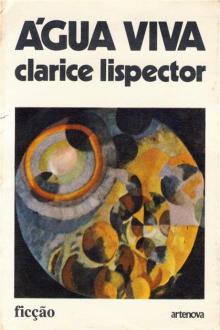 The Stream of Life
The Stream of Life The Complete Stories
The Complete Stories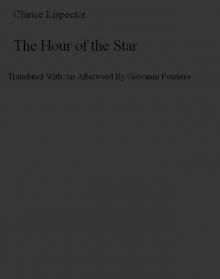 The Hour of the Star
The Hour of the Star The Besieged City
The Besieged City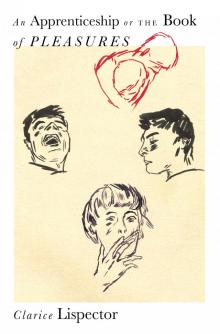 An Apprenticeship or the Book of Pleasures
An Apprenticeship or the Book of Pleasures The Chandelier
The Chandelier A Breath of Life
A Breath of Life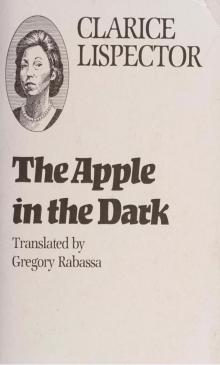 The Apple in the Dark
The Apple in the Dark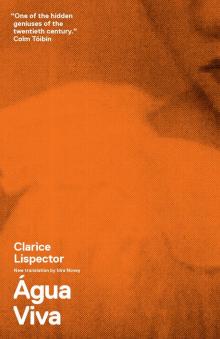 Agua Viva
Agua Viva Complete Stories
Complete Stories Near to the Wild Heart
Near to the Wild Heart The Hour of the Star ()
The Hour of the Star ()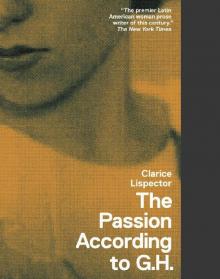 The Passion According to G.H.
The Passion According to G.H.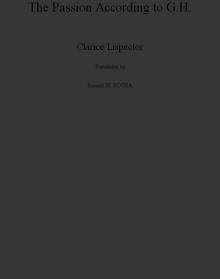 The Passion According to GH
The Passion According to GH